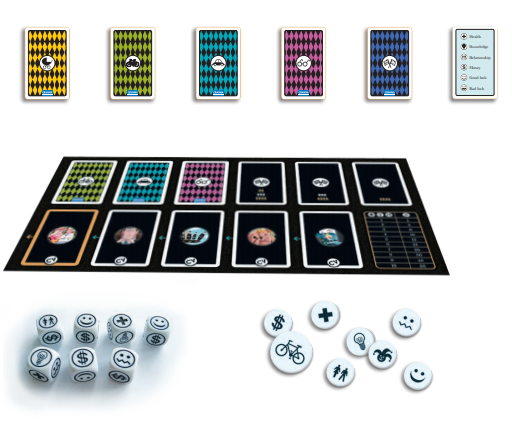Build and Tell Your Life Story in CV

Build a life, make friends and connections, change jobs, and put together your work history!
CV is a dice and storytelling game with set collection, in which players put together their lives from young adulthood through old age. Start a board game group, work for dad, and purchase a used car, in a board game that’s all about life.
Gameplay
There are three decks: early adulthood, middle age, and old age. At the start of the game, five cards are drawn from the early adulthood deck and placed face up on the game board. Cards will be drawn from the early adulthood deck until it runs out and then you will move onto the middle age deck and so forth.
On your turn you roll four dice (though cards you gain can allow you to roll more). Any bad luck you roll cannot be rerolled, otherwise you can reroll any other dice up to two times. Dice results include health, knowledge, relationship, money, bad luck, and good luck. If you ever roll three good luck, you can take any card from the board. Each card on the board lists which of these results, and how many, you need in order to buy it. You may purchase up to two cards on your turn. After your turn, the board is filled back up.
If you purchase event cards, these go into your hand. You may play these on your turn as a one-time bonus. They do things such as helping you avoid bad luck, giving you extra resources with which to buy cards, or allowing you buy cards at a cheaper price. All other cards you buy go in front of you, with job cards going in the same stack as your other job cards, health cards in the same stack as your other health cards, and so forth. Job and passion cards always go on top of the last card of its type you purchased; but for health, relationship, and knowledge cards you may choose to either put it on top of their respective stacks on under any other card in that stack. The card on top of a stack will often give you special bonuses such as extra resources, extra dice to roll on your turn, or the ability to spend one resource in lieu of another.
Once every player has taken a turn, the card on the farthest left of the board is discarded and replaced before play continues. The game ends once there are fewer cards in the old age deck than there are players in the game. Players then calculate their scores.
There are two life goal cards on the board. These award points to the player who has the most of the necessary cards listed on them. Each player also has their own private life goal which awards them points based on the number of necessary cards they have. You also earn points for the number of knowledge, health, and relationship cards you have, and each possession card always awards you points. The player with the most points wins the game.

Review
CV is a lot of fun with the right group of players. What makes it enjoyable are the stories that start to develop as you acquire more cards and start to put a life together for yourself. For instance, you might pick up the 'college friends' card and find yourself falling in love with one of these people and getting the 'marriage' card. Then you might reconnect with another college friend from the past who invites you to hear them play in an orchestra ('friends in the orchestra' card). There are limitless possibilities as you build a virtual life for yourself.
There’s a nice wide range of cards in the decks that can be paired together in many different ways to tell a wide range of stories. The artwork on the cards is also unusual and unique, however the cards are thin and liable to bend easily and the dice are light.
While the game has some push-your-luck elements to it, you ultimately have little control over the dice rolls and there is little to no way to mitigate bad rolling, particularly early on.
If you come to CV looking for a great dice or set collection game, you will probably be disappointed. But if you come to it looking for a great storytelling/party game, play with a group that enjoys those things and isn’t going to care to much about who wins, and you can have a lot of fun with it.
Pros: Wide range of cards, unusual aesthetic, fun with the right group
Cons: Few ways to mitigate bad rolling early on, components could be higher quality
Disclosure: we received a complimentary review copy of this game.







